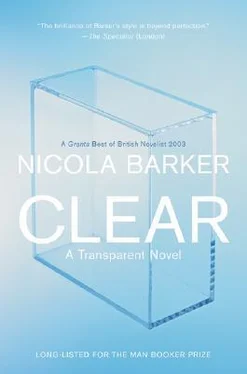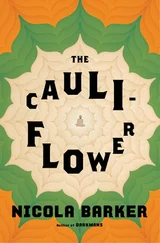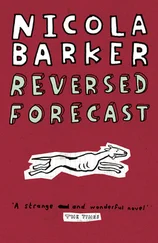But later — after we go — there must’ve been a riot. The following morning the entire pavement is a skating rink of yellow yolk and albumen. The atmosphere is leaden. And there are schoolboys on the bridge, hurling onions at him. A local woman walks by, with her dogs, she stands and stares at them. ‘Shame on you,’ she keeps saying. ‘ Shame on you.’
But the boys keep on throwing, their eyes glazed over, like they can’t even see her, like they can’t even see him.
The cockney girl is still there, still hollering, still banging on her tambourine. And she seems to be singing straight at them. She’s plum in the firing line of all those onions (remember that deal with the angle of the bridge and everything?) but she seems actively intent on provoking them further. And I don’t know why. I’m not sure whose side she’s on. And I’m not honestly sure if she knows, either.
It’s been so long.
Soon the fences come down.
They erect a huge screen.
The last day. A Sunday. By early afternoon, gangs of people are starting to line the bridge already. And there are dense crowds on the embankment, including huge Asian families from the East End who are wandering around cheerfully, secure — for once —in the knowledge that they won’t be the people having the fruit thrown at them.
The stairs are jammed. The T-shirts are selling. Strange music is playing over the loudspeaker (dippy, shitty, modern, hippie stuff with a female singer). The angle of the box has been readjusted, to give a larger crowd a much better view of it, and on the massive screen a static image of Blaine is being projected, an unflattering shot, which looks like it might possibly be the passport photo of a down-at-heel worker from the Algerian Embassy.
There is an ambulance.
Blaine has his back to the crowd. He’s talking — through a hatch — to the people in the disabled access / viewing area behind him. It’s a long conversation. But the crowds don’t care. They’re so full of happy anticipation. Sometimes he lifts up his mattress and peaks out through the glass bottom and interacts with the people directly below him.
He looks wan, and so thin, now. His hair is flattened down over his forehead. And every so often he pulls at the beard on his chin, neurotically, as if he longs to yank the bristle clear out of the skin. But he’s holding it together. In fact he’s finding himself again. Little by little that necessary transition is taking place — from sitting-duck to superstar, from total access to none.
Bly says she’ll come, and even Solomon says he might drop by (you believe that ? Then you’ll believe anything). Twenty minutes till lift-off, though, and I’m here all alone, slightly surprised that the bridge isn’t busier.
At the far end — apart from the roasted chestnut stall and the hot-dog seller — it’s still relatively negotiable. Way off in the distance you can see the box — hanging, luminescent — but a tree obscures the big screen where a documentary is being played (this is presumably Korine’s big moment) in which Blaine appears to be pulling out his own heart on a quiet London street, in front of a bemused-looking woman who plainly just wishes he’d shut up and fuck off.
There’s shots of city pigeons, creepy, glockenspiel music, simpletons gazing confusedly at the camera, nudists, red balloons, all subtly intercut with ardent fans making speeches about how Blaine has taught us all something unforgettable about the human spirit.
I walk on, past the ticket kiosk (by the first of the two main towers), squeeze around the corner — things are getting pretty tight here — and see a woman climbing up on to some thick, hazardous-looking grey railings. I follow her lead and clamber up on to the other end. We balance precariously together there.
People of all colours are rushing by. Hasidic Jews in abundance with their hats, their ornate ringlets and their crazy silk attire. Kurds, Turks, Africans, hard-core Muslims, hooded gangs of city urchins. People with prams. Toddlers . An old Indian guy — like an ancient mystic of some kind — with his hair caught up into a bright blue turban, being pushed along in a wheelchair.
And the Pool of London is full of boats (to the foreground of the Belfast , which is lit from below, generating a mess of funnels and geometric shadows, like some kind of lovely, moist, mad-angled Stanley Spencer); they’re mainly police launches (this thing could potentially be a logistical disaster ), there’s the fire-rescue launch, and the harbour master…
Has this bridge ever been so full of laughter and bustle?
But we can’t see him (not from here, not with the naked eye), because the TV lights reflect off the box, so he’s just this hunched black shadow, like a fly swatted against the glass, a smear. Only very rarely does the huge screen project live images of him. And when it does, he offers such a strange and violent contrast to the carnival around him. Like one of those videotaped kidnap victims, cruelly manipulated by terrorists to pull his home nation’s heartstrings.
Time passes. The party continues. But tonight we’re ALL to be held to ransom by the TV executives. Forty-four days — to the minute, to the second —comes and goes without incident, and still he remains suspended. Some people are getting emotional, are shouting, ‘ Let him down! Let him go !’ A nervous voice over an intercom system tells us that there’s only one more commercial break, and then…
And then finally— finally —it’s time. There’s not a countdown, there’s not a drum roll, just a green crane lowering a perspex box, a smattering of applause, and when it lands, with a thump, he doesn’t climb straight out. He stays in. He seems almost afraid to leave (remember Kafka? ‘The Hunger Artist?’). He’s changed his clothes; still in his trademark black, but wearing a loose robe and a scarf. And there’s something so formal, so poignant, so dressed-up about him.
He’s posing for photographs. The stretcher is there, the ambulancemen in their fluorescent yellow jackets. Some scales. They take off his coat, his scarf, and weigh him. Weigh him?
He’s lost four stone, they announce.
(So what’re we meant to do now? Cheer? Like he’s Weight-watcher of the Year?)
He seems — it’s hard to tell — quiet? Overwhelmed? Bemused? He suddenly starts shaking. They wrap him up in a blanket. They ask him some questions. He begins to say something, and just as he opens his mouth, a terrible cacophony — or a magnificent one, depending how you look at things — roars out over the river.
Eh?
I spin about on my railings, craning my neck, but can’t see anything. I jump down into the crowd. My T-shirt gets caught and I’m left momentarily dangling. I tear it free, push my way through to the edge of the bridge and peer over.
Ten thousand people have just turned, en masse, to see a tiny, hired boat, crammed to the gills with groovers and Brothers, and on the roof? Three shady figures, one with a mike. In the water around them, a still tinier craft in which a film-maker holds a camera.
It’s Dizzee Rascal, this year’s Mercury Prize Winner! He’s singing his new single. ‘Just a Rascal, Dizzee Rascal…Just a Rascal, Dizzee Rascal.’
He’s making himself a video — using the lights, using the crowds, using the atmosphere…
Wha?!
Can it be possible? That this scraggy, opportunistic East-End scrap is planning to steal the initiative — the limelight — from the world’s greatest illusionist?
Читать дальше
Конец ознакомительного отрывка
Купить книгу












